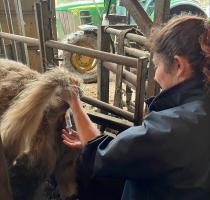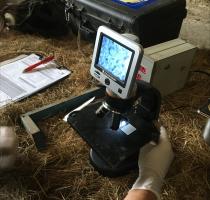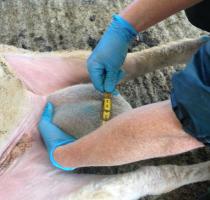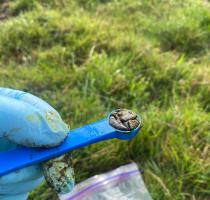The Animal Health & Welfare Pathway (AHWP) launched in the Spring of 2023 and continues to run. We have now carried out many visits, with clients successfully claiming and receiving funding. If you haven’t yet applied, it isn’t too late to get involved!
The funding is available for all Basic Payment Scheme (BPS) eligible farms with at least 11 cattle or 21 sheep. Initially the funding will be for a single species: £436 for sheep, £522 for beef or £372 for dairy herds.
To apply, click here to visit the government website. It is up to you as a farmer to apply – this is not something that your vet practice can do on your behalf.
When applying, you will need to provide:
- your customer reference number (CRN)
- the SBI number of the business registering for the review
- the business email address linked to the business registering for the review
- your RPA password
Once you have applied you will receive approval and a link to sign up; once approval has been given the work must be completed within 6 months.
This 6-month timeframe is important as on many farms the required endemic disease testing may only be possible at certain times of year.
What do the visits involve?
For all species, in order to receive your payment a portion of the funding must be spent on surveillance for the specific endemic diseases recognised to most limit productivity in the national herd and flock, as outlined below.
The most significant cost to sheep production has been identified as wormer resistance. This is assessed by submitting dung samples for a worm egg count – counting microscopic worm eggs in faeces to give an indication of the level of worm burden present in the animal. If the level is high enough to warrant worming, a second sample is collected 7-14 days after treatment. The difference between the two counts gives an indication of how effective the wormer has been. This knowledge can help you manage worms more effectively in your flock.
Worm burdens tend to be most significant in grazing lambs, so the main period for testing is typically May to November.
For cattle, BVD testing is required. In beef herds, bloods will be taken from 9-15 month old homebred animals (six animals per separately managed group) to screen for antibodies, which if present indicate exposure to disease. In dairy herds, virus testing is carried out on a bulk milk sample. Exposure of your herd to the BVD virus is likely to have a significant negative effect on both calf health and cow fertility.
The main period for testing in beef herds will depend on when you calve, particularly if you sell stores. Block calving herds may need to take calving pattern into account when sampling.
In addition to endemic disease testing, the funding can be used for whatever you feel is appropriate. If you are unsure what would be most useful for your herd/flock, we are happy to guide you, and a good starting point will be talking about what you would most like to achieve, do more of – or less of! Some ideas include fertility examination (rams, bulls), pelvimetry (heifers), refining liver fluke and worm control, ewe metabolic profiling and nutrition planning, calf health monitoring, thin ewe investigation, pneumonia and scour investigation and control planning... the list is almost endless.
How do I get the payment?
Once the work has been completed, your vet will provide a visit report and lab results along with their RCVS number. You will need to submit this alongside the Calweton invoice raised against your account. You will then receive the payment.
The driving force behind this scheme is that by working with your vet, the health of your flock / herd can be maximised – with the knock-on effect that productivity is as good as it can be. We very much hope that this will be your experience!



